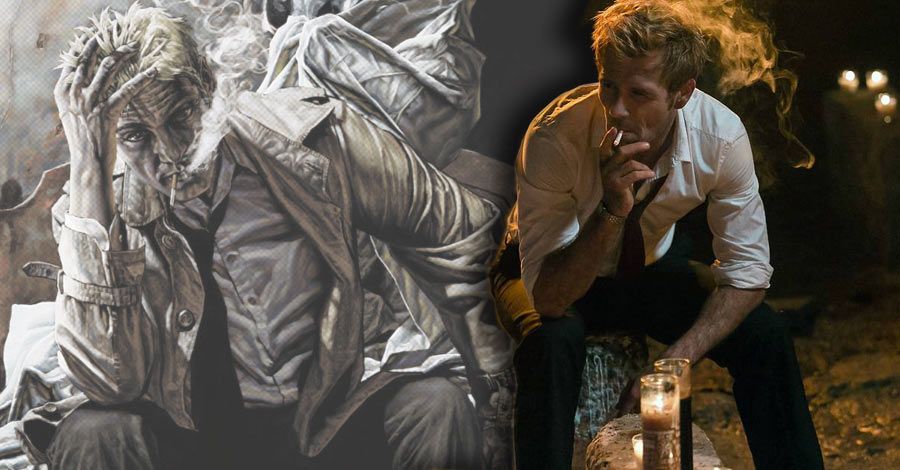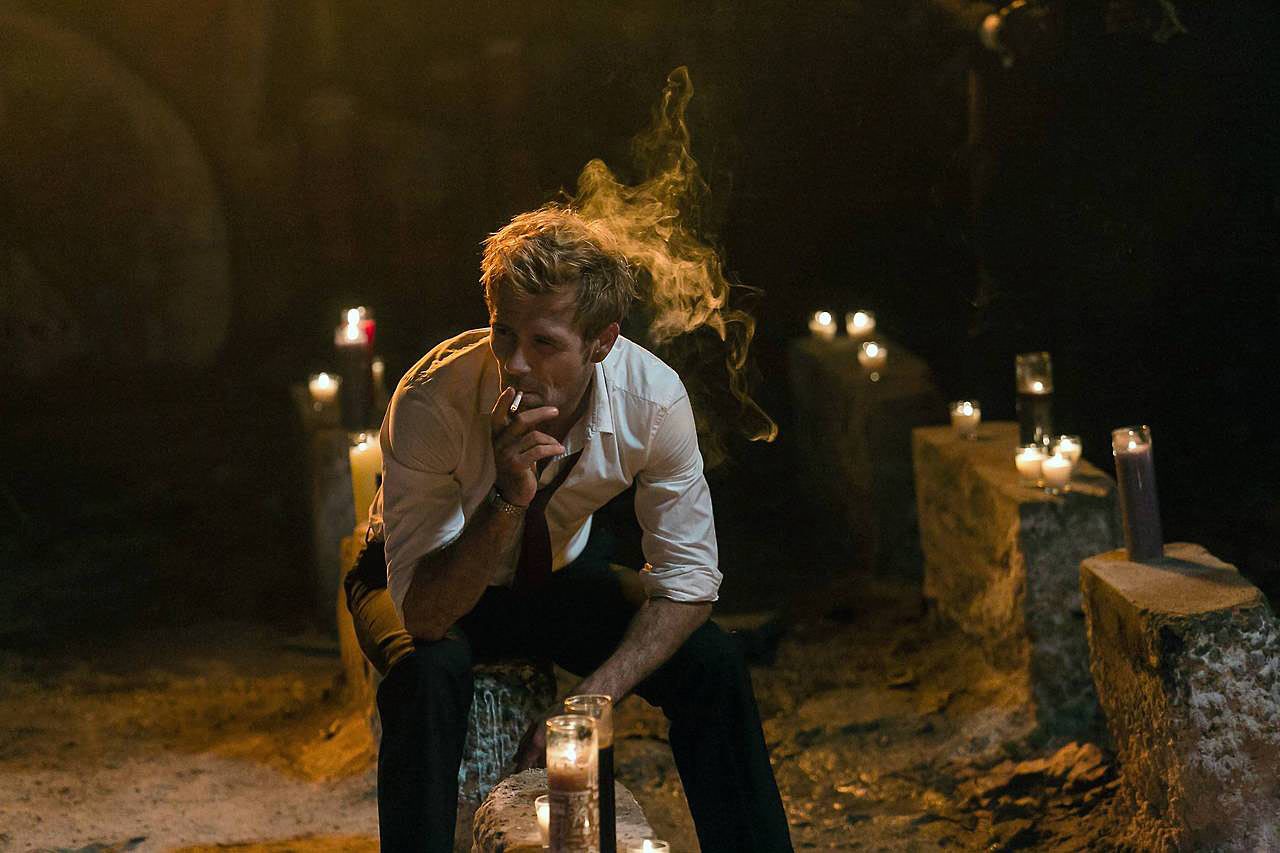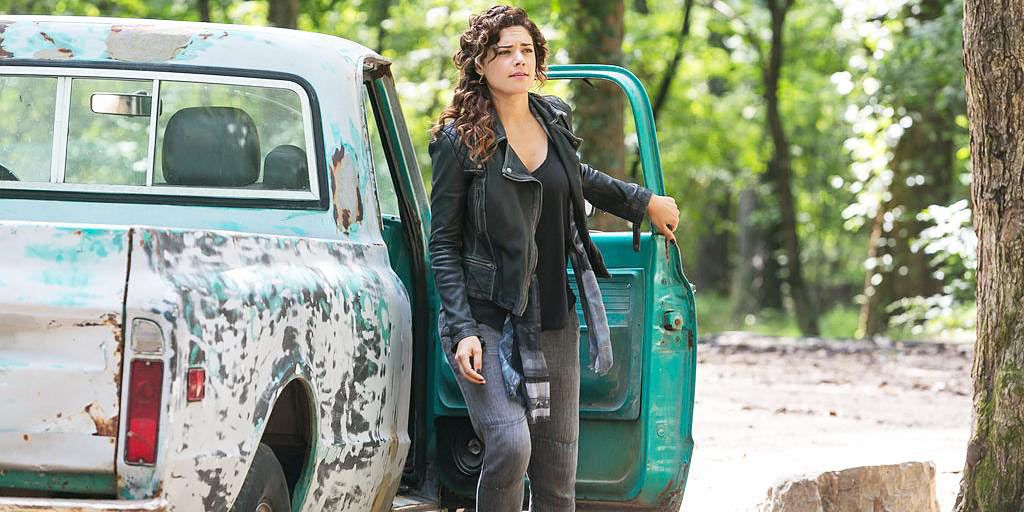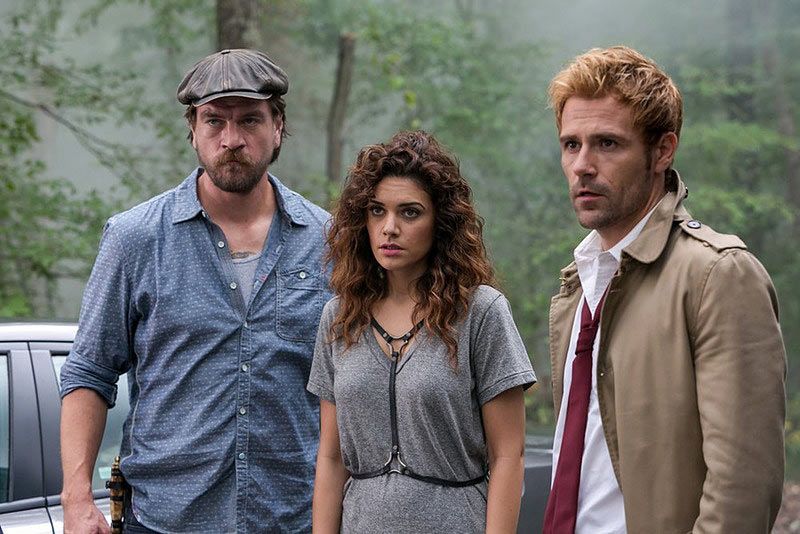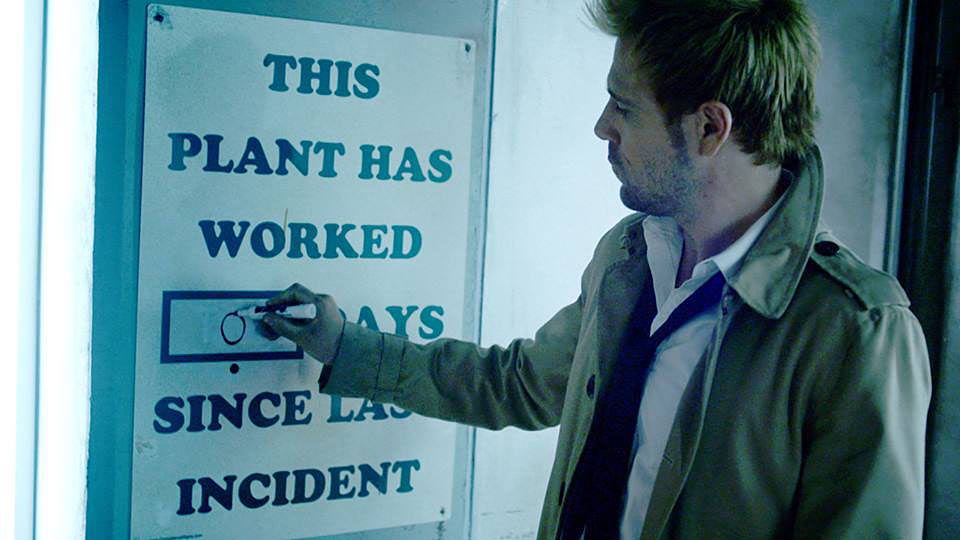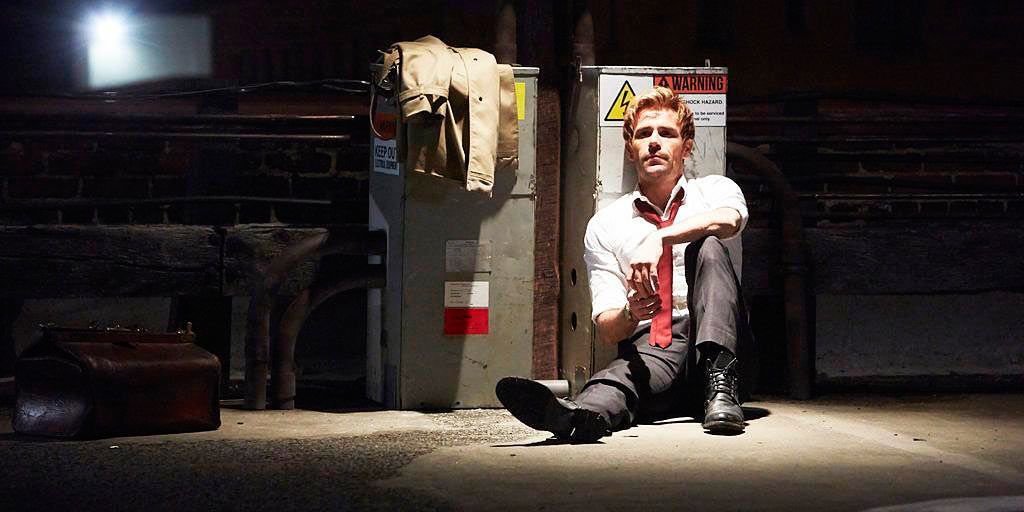If "Constantine" showrunners David S. Goyer and Daniel Cerone have their way, TV audiences will fall in love with the very same snarky but tortured bastard that took the comic book world by storm three decades ago.
Cerone Raises a Little Hell with NBC's "Constantine"
In a conference call with the press, the duo shed new light on the dark, supernatural NBC series, which has debuted to solid ratings and respectful reviews from both the mainstream media and hardcore fans -- and that's just the way they hope to keep it as they continue to interpret John Constantine's mythos and mojo and explore even more corners of DC Comics' occult realm.
On the genesis of "Constantine" as a television project:
David S. Goyer: The genesis of the project is that I had a meeting with Warner Bros. Television -- this is sort of right after "Man of Steel" had come out, and they asked if I would be interested in doing a television show based on a DC property. And so we just started having a general conversation about which one made most sense. The first character I asked about was John Constantine. I've always been a huge fan -- I was reading "Swamp Thing" when he was introduced, and, in fact, I have a letter printed in one of the early issues that he was introduced -- as a fan, I think when I was in high school or something like that.
There were some sort of legal things to sort out initially, and then we start talking about other characters. But eventually Constantine became free and I was really excited... It was refreshing for me to tell a story about an anti-hero as opposed to a hero and he is someone who was really damaged and I just feel like he's one of the great characters of sort of modern literature.
On the connection between comic book storylines and episodes of the show:
Daniel Cerone: We're digging as deeply into the Constantine mythos as we possibly can. In fact, it really is inspiring much of our storytelling. The episode that is airing this Friday, which we're extremely excited about -- "Feast of Friends" is the title, and that's a story that's literally ripped from the pages of "Hellblazer." It is the first story and it brings back Gary Lester, who is John's friend from Newcastle. And it's a fantastic story that translated so well to screen. And I would urge anybody who's listening to this to try to watch it before Friday and get people talking about it because it's our show at its pinnacle and it just set a bar of everything that we hope this show can be and can do.
Before the end of the season, you're going to meet and get to know every one of John's friends from Newcastle that were involved in the sort of faithful exorcism of Astra that led to the external torment of John's soul. And so you're going to meet them all. Papa Midnite, I think, we have now in four episodes. Jim Corrigan comes back for a couple of more. I'm reading an outline right now for Episode -- what is it, 16? -- that includes Terence Thirteen. We have Felix Faust. We have this incredible source material and we want to honor it and dig as deeply into it as we possibly can, and at the same time we're a weekly network show and we have weekly stories. And we're trying to present the best of both worlds in terms of ongoing mythology with the "Hellblazer" and DC world but wrapped around weekly stories the viewers can hook into.
Goyer: We read the responses to various episodes. And I think we have three episodes so far and I know that people seemed to really like the last episode that introduced Papa Midnite, but some people said, "Okay, so now we know what the formula is going to be week after week and we still haven't heard much more about the rising darkness or Newcastle." Well, you're about to with the fourth episode. And we think that's sort of the right time to do it. We're not a fully serialized show. We're kind of a hybrid between standalone and serialized, and we're going to start introducing more back story elements every few episodes or so.
Charles Halford Blazes a New Trail on "Constantine"
On developing the character of Chas (Charles Halford) for the show:
Cerone: Chas is an interesting character. When David and I developed the show and sat down to figure out what characters do we want in a continuing basis, on one hand Chas was a natural because he's the most constant companion and long-living companion -- maybe the only living companion of John Constantine's. But really he's not much more than the muscle and he's the driver. And so we want to include Chas and he is definitely the strong, silent type -- a very laconic kind of character we wanted to roll out slowly. I know there's been a couple of issues where they dig in his backstory but there's not a lot there. So we've really opening Chas up. We will open him up deeper in Episode 10.
Let's put it this way: in the pilot episode, you see that Chas comes back to life. For some reason, people started translating that to the idea that he's immortal. We promise you he is not immortal. There's a very good reason that he's coming back to life... We do have an episode that involves flashbacks where we basically tell that story and we get to know more about Chas, we can meet Renee and his daughter -- and we dig into that story and figure out what makes Chas tick.
Goyer: Even when the first 13 episodes are down, people will be surprised at how much kind of background we filled in on various characters and even in terms of the relationship with John and Manny and Zed's backstory.
On the decision to eliminate the Liv character played by Lucy Griffiths in the pilot:
Goyer: Honestly, it really wasn't that difficult... I think that the character was flawed in its conception, and obviously we're to blame for that. She was the only major character in the pilot that wasn't from the comic books, and sometimes you make these concessions when you're trying to get a show off and running. And one of the benefits of doing a pilot is you've got this initial downtime after the pilot before you're filming again in which you can think about retooling some aspects. And once we saw the character in action and we started breaking Episodes 2, 3, 4, 5 and 6, we felt like we were just running into a lot of dead ends. And that's when we decided to go back to the source material and talking about the character of Zed, and I will say I feel like that the vast majority of the audience seems to have felt that the Zed character was a better match for John and seems to have supported our decision.
Cerone: As we dig deeper into the season, as we start talking about possible arc for next season, I would say there's an opening there. Whether it's an opening we'll step through or not, it would have to be organic, it would have to feel right and not feel like a device. But if there's an organic reason to bring her back into the story, we'd love to.
On how Constantine's longtime fan base influences the show's creative direction:
Goyer: I've adapted quite a few comic book properties now. And it's tricky because I think you have to be really attentive to the fan base. What we talk about is -- but at the same time -- I mean, I'm [paraphrasing] Steve Jobs: You can't give the market what they say they want. You want to give them something that they haven't even thought of. If you give them exactly what they want, they become disappointed by the same token.
The way that we've always tried to measure it is that we've tried to dip in with the fans and be aware of what are the issues that are most important to them, what are the core concepts that are most important, with the characters what are the most important. But we are also cognizant of the fact that if the show is going to flourish and broaden its audience, we need to be able to respond to an audience greater than just the core comic book fans. It needs to work for both audiences.
Cerone: We fell in love with all the things about John Constantine that the fans did, at least based on what I've read of the fans. But we needed that smartass, wisecracking, gallows humor, scruffy, blonde-haired, trench coat-wearing, cigarette-smoking breath with a fatalistic attitude and this deeply humanist point of view for reasons that he doesn't even understand. We like that character. That was someone that just appealed to us. So we're going to be true to that no matter what.
We wanted to stay true to the world and the characters, and then you take that foundation and you have to figure out, "Okay, how can we pour that into a show that can last and sustain itself on a weekly basis?" And NBC had certain desires for the show. They wanted stories that were told every week. For us, it was "Okay, how do we figure out how to both -- as fans, tell the story we want to tell about the evolution of this character and his relationships as well as some closed-end stories to broaden out the fan base?"
Goyer: Because we were fans of the character, when we first met with NBC, we said, "Look, we know that the Keanu movie is out there and it wasn't British and he didn't have blonde hair." And I think that that movie had a lot of great attributes, but because we had fallen in love with the John Constantine as depicted in the comic books, it was our mission to try to bring to life the character that accurately reflected the character we had fallen in love with as possible. So when NBC says, "Well, does he have to be British? Does he have to wear skinny ties and a trench coat? Does he have to be blonde? Does he have to smoke?" we said "Yes." And they said "Why?" And we said, "Because that's the character we fell in love with."
Cerone: Every step of the way, they did ask those questions, too -- like, they were very open and accepting and loving and they wanted to embrace the fans, too, but at a certain point, like when it came to casting, Matt Ryan does not have blonde hair and initially, they're like, "Do we really need to lighten his hair?" And we're like, "Yes, we do." They got the first draft of the script and they saw all of the kind of British euphemisms and colloquialisms written into his dialog and they're like, "That might be off-putting. Does he really need to be British?" Yes, he does. So at every step of the way, we fought for that. And to their credit, they were very open and they understood our passion -- and, I believe, the fans' passion -- for the character.
On whether the network has exercised any censorship on the show's story content:
Cerone: They have pushed us to go bigger. They have pushed us to go darker. They pushed us to go scarier. If I had to broaden a note down to one, it would be, "Just make this as big and scary as possible." That's what they want to see. So it's been really framed for us. We have to do what we do within budgetary limitations and capabilities, but no, they have not censored us at all.
On the pluses and minuses of having an anti-hero lead the show:
Goyer: In some ways, anti-heroes are more fun to write for because they're not bound by the same moral code that the heroes are. And in some ways, anti-heroes are more human, because most of us have variables. Most of us are imperfect. And he's doing what he's doing for fundamentally noble reasons but he doesn't really have a code of conduct. I do think that audiences also like anti-heroes. If you look at House, if you look at Luthor, if you look at Sherlock, I would categorize these characters more properly anti-heroes than heroes. They can be fun and different -- they're not operational. People want to be them and people want to be Superman. I don't think people want to be Constantine because he's kind of a miserable git, but he's also fun.
Ryan on Bringing Antihero "Constantine" To Life, Expanding DC's TV Mythology
Cerone: Constantine is doing the right thing but he's doing it for totally humanist reasons. It's one of those fascinating aspects of the character to me is if you ask him why he's out there helping humanity, I'm not even sure he can tell you. Is he doing it because he wants to save lives? Is he doing it because, frankly, chasing demons is a bit of a fix for him and he's just challenging for the next kill? Is he doing it, as he said early in his career, for the women and to get laid? Is he doing it because it's kind of self-empowerment? It's just never really clear. And what's great about him is I don't even think he's clear. But yet, he keeps doing it and he keeps fighting this fight. One of the funnest things is that there's no code of conduct that he operates by. He's doing the good things that all the cops and lawyers and whatever kind of other heroes are out there doing, but there's no checks and balances for him. And that's where he often gets into trouble.
When you ask what makes him relatable, I think that's it because he has a self-sense to himself and he frequently goes over the line and he frequently makes bad calls, and the fact that anyone who gets close to Constantine dies. That has proven itself true for years in the comic books. And very early in our series, you're going to see that, too: where he makes the hard calls and he loses friends over it, sometimes literally. That's kind of his curse and hopefully, that's what it easy to root for him.
On the impact of DC's current New 52 incarnation of Constantine on the series:
Goyer: As the the resident comic book nerd, I would say that the show is almost exclusively influenced by the Pre-New 52 "Hellblazer" comics. If for no other reason then "Hellblazer" ran for 300 issues, and the new "Constantine" is less than 20. There's just not the body of work that exists in terms of what we're influenced by. So without question, and I know this is really inside baseball, but the show is primarily influenced by and inspired by the pre-New 52.
Cerone: We have the whole Constantine canon at our disposal in terms of storytelling. We do look to the newer issues to see if there's interesting story ideas for us or stories that we can use or adapt... It's just like this fantastic car that we've been given the keys to, to take it for a spin and we're doing that on network television. And the writers of the New 52 "Constantine," they're doing the same thing as we are: they're basically rebooting the franchise. We're rebooting for television. They're doing it for sort of a new generation of comic book readers. So we're kind of charged with the same task in terms of taking what was there, the foundation of what was there, and just trying to honor it and do the best that we can with it for our medium.
What we're doing on our show is we're going back to beginning. We're basically meeting [him at] roughly the same time that you met him in "Hellblazer" in the very first issue. So our timeline, when people are like "Wow," in terms of the cancer story and all the great arcs that he has, we just hope and pray that this show has legs because we'll get to them. We love those arcs -- "Dangerous Habits" and all the arcs that everybody else is excited about, we're excited about. And what's great is that we're choosing an entry point where the character is young and all those adventures are ahead of him and we hope to dramatize as many of them as we possibly can.
On distinguishing the series' supernatural take from other contemporary shows set in similar realms:
Goyer: Taking nothing away from those shows, I think what's fundamentally different about our show versus like, "Oh, well, just show people the supernatural," is the John Constantine character. He's amazing character. And with all due respect to those shows, he was around a lot earlier than they were. And I know some people have said "Oh, this is the character on 'Supernatural'" -- that Constantine is like that character [who] was influenced by Constantine, not the other way around. And he's been around for 25, 30 years. So I think once people see a few more episodes under their belt, it's a very, very, very different show than those shows. And I also think there's room for all of that.
Cerone: As a storyteller, you can't pay attention to what other people are doing on similar shows. I think that's where you get into trouble, frankly, because if it's in your head, "Oh, they did this creature," or "They did this scare," or "They did this sort of legend or mythology." Then you start comparing yourself, and we're just trying to channel the character John Constantine as clearly as we can. One of the first shows that I came in on as a young writer was "Charmed" and I spent the first four years of my career on "Charmed." We're doing this on "Charmed" before they're doing [it] on "Supernatural." "X-Files" is doing it before us. "Buffy" was in the middle of it all. All you can do is trust your characters. That's, hopefully, what people are tuned in to every week and within that framework, we try and tailor it: we might do a vampire story or a zombie story. There's elements of a zombie coming up for us, but a look filtered through the world of Papa Midnite, so it's voodoo zombie. It's more old school: raise and bring recently-deceased humans back. It's not the apocalyptic zombie virus that we're all accustomed to. So we're always going to spin it through our filter, but you can't worry about what other people are doing and really tell good stories.
On finding the right balance to please devoted fans and audience members new to Constantine's world:
Cerone: I actually feel like we're tipping closer to creating the show for the non-fan and the fan, truthfully, because there isn't a single episode or story we tell where we're just not sitting down to tell a coherent story and every week introduce a danger and characters that you can relate to and care for, and at the same time we're trying to spin out this central character of John Constantine as someone who is full of aches and pain and guilt and torment and is going about doing something because he feels personally compel to do it -- You don't have to know of the character Papa Midnite. You don't have to know about the Newcastle crew. You don't have to know about Felix Faust or the Doctor Fate helmet or any of these elements that we're using to enjoy the show. Every week, we're just trying to tell the most sort of honest and accessible and humanistic stories that we possibly can. But there's an added layer on top of that for the comic book fan where if you know the world, if you know John Constantine, if you know "Hellblazer," if you know some of the iconic images and people on the DC world, it's value-added. It'll provide that much more entertainment and fun, hopefully.
Goyer: Let's talk about, for instance, the introduction of Jim Corrigan, who's a character the comic book fans will know. The working rule of thumb that we've gone by is, as fans it's exciting for us to introduce a character like that and we know it will be to the comic book fans. He becomes another DC character called The Spectre as supernatural figure ultimately. But the point is it's fun for us as fans to say "Hey, let's get this character in there." But we don't want to do it just as a stunt cast and we won't do it unless it's organic to the story and we can introduce the character in a way that people who never read the comics will understand who he is and won't be lost without his back story.
To Help Connect to Constantine, Ryan Keeps "Hellblazer" Handy
So we have to make sure that every time we introduce a character or a plot element like that, we can do it in a way that stays true to the source material but doesn't alienate the broader audience and they feel like they're missing out or they don't understand the story because they haven't read the comic books.
Cerone: Jim Corrigan is a great case study. If I can present for an instant how the Jim Corrigan character came into being on our show, for [an episode] called "Danse Vaudou." It airs [Nov. 21]. We did an episode where we're like, "All right, let's start it with urban legends." There's a perfect example: everybody does their urban legends [episode] but we're not going to call them urban legends. Let's just bring some urban legends to life and let's do serve a thematic urban legend episode. And we basically decided to do three of them. One was the vanishing hitchhiker. One was the slit-mouthed woman -- that's like the woman who carries a surgical mask in Japan. And the third was the monkey's paw, basically. So we decided to have three ghost stories and all based loosely on those urban legends. And they all end up being ghosts that are brought to life by Papa Midnite unknowingly because of the rising darkness.
So within the context of the episode, we realized we needed a cop character. There is a cop that was coming across various dead bodies that were connected to this ghost, and we're like, "All right, we're going to expose a police officer to the supernatural world here." And so right away we're like, "Is there anyone in the DC world that we can plug in?" Again, it's value-added, kill-two-birds-with-one-stone, and we thought "Well, Jim Corrigan is this cop, and very much like Constantine, kind of takes the law in his own hands -- really hard charging, will do anything for the arrest, and he ultimately is killed and comes back as The Spectre character." We're like, "What if we meet him now as a cop?" We're sort of seeing like a bit of the origin story of Jim Corrigan where he sees the supernatural world open to him for the first time.
And so a) we're introducing Jim Corrigan; b) we're giving John Constantine a friend of the force for future episodes, and that's just sort of how that happened. But it came from very organic story place. It wasn't about servicing DC fans. It was literally about just trying to tell a good story.
"Constantine" airs Fridays on NBC.

